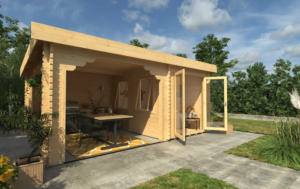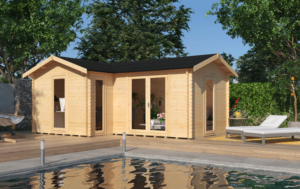Woodlands Home & Garden Group has been around for a while – just over 110 years to be precise. The company was established in 1913 as a bespoke timber furniture manufacturer. In the late 1970s, the company came under the ownership of the Moran family when it was bought by Eric Moran who soon brought his sons into the business.
This change of ownership also signalled a change in direction for the company.
“In the 1980s the company was still making bespoke furniture and importing timber,” says Ross Moran, Eric Moran’s grandson and the current Chief Executive of the company. “One of the early things Eric did with the firm was create a large DIY store at our head office in Horsforth. From there he and the team moved into manufacturing.”
The journey was not without its false starts – Woodlands’ first steps into manufacturing were in the fencing sector, but it was a tough market to crack. So instead, the company moved into garden buildings in the mid-1980s. Here, lightning struck, and garden buildings have been a key focus for the business ever since.
In 2005 the company moved to a new site and commissioned a purpose-built factory to expand its manufacturing capabilities, and by 2007 Woodlands Home & Garden Group had expanded its offering to include log cabins alongside garden sheds. But perhaps the biggest step in the company’s journey came when it launched TigerSheds.com, its very own direct-to-retail brand.
“Tiger has become one of the biggest parts of the business, accounting for between 60 and 65% of the business,” Moran tells us. “We are continuing to push that side of the business, with great results. Our ambition is to be the number one known brand in garden buildings.”
Woodlands Home & Garden Group has made big strides towards that goal over the last couple of years through television advertising and the introduction of a growing franchise network that will bring its branded products into brick-and-mortar retail locations.
“We recently made our first acquisition when we bought a local manufacturer of modular buildings, high-end garden office, and modular construction,” Moran says. “We have integrated that into the Tiger brand, as Tiger Modular, which now forms part of our over-arching garden building offering.”
 Brand New
Brand New
Before Woodlands Home & Garden Group introduced the Tiger brand, many in the sector would have questioned whether there was even a need for a shed manufacturer to build a brand. Brand recognition, and even build quality, have never been particularly strong focuses for the shed market.
“Garden sheds have historically been a commodity market,” Moran points out. “The market has offered cheap storage, looking to sell as many units as it can. Most of the products on the market are very similar. The selling points were typically price and geography, with customers looking for a local supplier, or simply the cheapest. Our ambition was to move that on and create a different and recognisable product.”
That brand is reflected in every aspect of the Tiger product range.
“Even our cladding is machined in a different way,” Moran says. “We offer a Tiger-branded welcome pack with all of our products. We are trying to shift the way garden buildings are sold. Our view is that outdoor space means much more to the consumer, and the market view on that changed during Covid when people were forced to spend so much time in their homes and gardens. It reaffirmed to us that we were not selling sheds or workshops, we were helping customers find a space that suits them, whether to work, create a business, or simply relax. We believe we have something in our range to suit all of our customers’ needs, which is very different to what people are used to.”
Boosted by the newfound appreciation lockdown gave consumers for their garden spaces, Moran believes that Woodlands Home & Garden Group has made a really strong case for a named brand in the garden building space.
“Hundreds of businesses were selling very similar products and driving prices down, which drove us into the decision to be different, creating and supplying a branded product that people care about in a commoditised market,” Moran says. “Some people might not think a brand needs to exist in this market, but we believe we have created something people can recognise. We are working hard to create a brand that has an emotional connection with the customer and a product people are aware of that is then attractive to them.”
 A Joint Future
A Joint Future
The commoditisation of the market is also an issue on the recruitment side. It is an issue that points to a new path forward for the company and a new era of ownership.
“Historically the only way to find the right staff was to pay more than the factory down the road, but ever-improving minimum wage levels mean all jobs now offer a similar starting wage level,” Moran points out. “These days it feels much more about the culture you offer.”
Woodlands Home & Garden Group is responding to this demand by introducing several employee engagement initiatives, and has achieved the Investors in People accreditation, but most importantly the business has recently shifted to an employee ownership model.
“The key thing around that is to create a future for all the staff where everyone understands this is about more than just a small elite ownership group,” Moran says. “It is about everyone pulling in the same direction with a culture of shared ownership. If the business succeeds, everyone succeeds together. It means we can show people a pathway for the future that others perhaps cannot compete with.”
For the immediate future, the focus is on growing the Tiger brand, integrating modular products, and expanding the franchise network across the country, with a target of introducing sites within 30 to 60 minutes away from every major city in the UK.
“A big part of that is finding people with experience in the industry,” Moran says. “Our key early successes have been in partnering with people who already work in the industry. Not only are we finding people who know how to sell the product, but also people with great experience of what does and does not work in the sector.”
As the franchise network grows, Woodlands Home & Garden Group has secured a major retail partner in Scotland, and invested in a new distribution hub in a country that will give the Group access to an incredibly active region and market.
“All the time we are increasing our Tiger network, bringing in experience from the industry to create better products and better processes,” Moran says.







